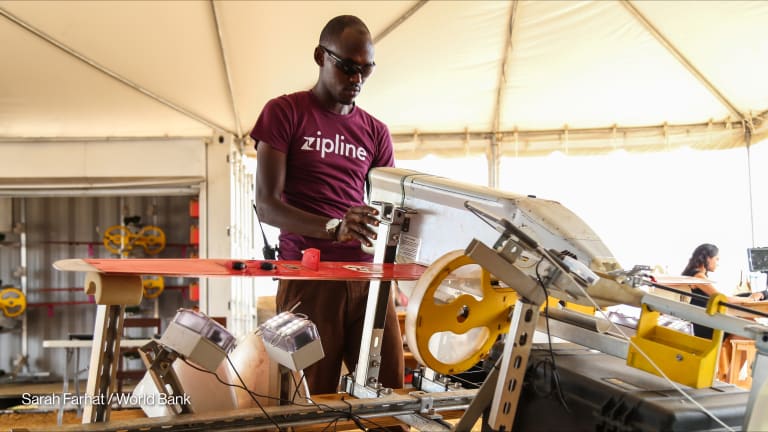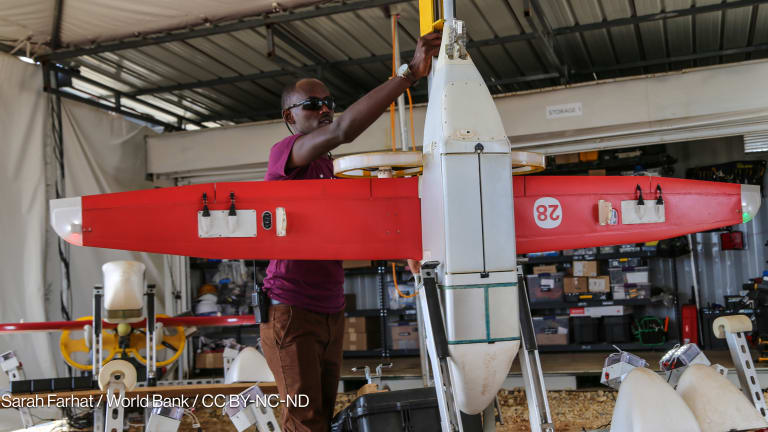Q&A: Biggest pitfalls for NGOs bidding on DFID contracts
As the share of the United Kingdom's aid spent through commercial contracts grows, many international NGOs are making the switch from traditional grants to contracts. Devex speaks to U.K. Department for International Development contract expert Haniya Dar about how to overcome the obstacles.
As the share of the United Kingdom’s aid spent through commercial contracts continues to grow, many international NGOs are making the switch from traditional grants to contracts. The competition is stiff, as for-profit giants such as Adam Smith International, PricewaterhouseCoopers, KPMG and others flex decades’ worth of experience, vast overheads and, in some cases, entire departments designed around Department for International Development contracting. International NGOs are also often intimidated by DFID’s value for money indicators, and worry they won’t have the risk appetite to stomach its payment-by-results approach, in which the delivery partner is paid for its work only after the results are delivered. Still, for many international NGOs, the benefits outweigh the risks. Organizations new to DFID are also in some cases finding subcontracting a viable way into the DFID market, as nonprofit colleagues such as the International Rescue Committee begin to offer opportunities for smaller or less-experienced organizations to join consortia. Devex caught up with Haniya Dar, a consultant at Hamilton Verney and veteran DFID contract specialist, on the sidelines of the Bond Funding for Development Conference in London to learn about the biggest pitfalls she’s seen among INGO clients trying to make the switch to DFID contracts. Dar also shared her insights on some of the internal obstacles INGOs might face — drawing on her experience building the in-house contracting department at IRC, now one of the biggest nonprofit players in the DFID contracting pool — and flagged some of the most recent changes at DFID to watch in the commercial supplier space. The conversation below has been edited for length and clarity. What are the biggest gaps in skills you’re seeing in NGO clients hoping to transition to contracting with DFID? The key one is experience. Many organizations haven’t done this type of thing before. Some of them have done hybrid grants, where they’ve got elements of commercial contracting; maybe they’ve got [payment-by-results], where there’s a requirement for prefinancing. For some of the more experienced ones, the gap is getting from the stage of bidding to actually winning. They might have a few bids in, but that lesson-learning hasn’t quite got there, partly because it’s a competitive environment so it’s harder to get information about best practices. One of the other challenges is that when you’re making that go or no-go decision on a particular tender, the INGOs focus far too much on the internal factors — geographical and sectoral expertise, and capacity — which is probably more relevant for a grant than for a commercial contract. I think there’s insufficient attention to external factors: Who else is bidding? What makes your bid better than someone else’s? Have you really assessed your chances of success, given that it costs so much in terms of investment to put a bid in? Even when you’re fairly experienced, these are expensive, hefty proposals, and there’s a lot of time invested in the partnership process to get to that consortium that’s really going to win it for you. But there’s also a skills and capacity gap, definitely. It’s a different way of doing the budget and fees; the expenses format is different; the payment-by-results aspect. I think writing a bid that is competitively articulated is also quite a challenge sometimes. Do you meet the evaluation criteria? And have you provided supporting evidence on the key things that DFID are generally looking for, outside of the very specific criteria? I think you need to provide more on things like value for money, transparency and perhaps a little bit more information on budgets and costs than they’ve actually asked for, in order to push your bid forward. And then the key one is negotiation, and also sometimes a little bit around [human resources] because you’re required to provide CVs of identified personnel in advance of having secured the project. Would you say the average international NGO needs transformative change in order to meet this standard? Some of it is around improving smaller things across the board, so not necessarily. And it doesn’t matter if you move to commercial contracts afterwards, because it’s going to benefit your grants as well. You’re going to have better streamlined systems and more efficiency because there’s a bit more time pressure. With contracts, we’re talking big, long-term funding. The smallest contract I’ve seen was for 5 million British pounds ($6.5 million), the largest was for 200 million pounds ($260.6 million), so you could possibly say that’s worth the investment. What can organizations do to better assess the competition? How do you get to grips with the competitive landscape as an INGO new to bidding on contracts? It takes a lot to build relationships toward getting that sort of information. Because it’s very much a competitive environment — far more than grants — it’s just not common knowledge. Even if you’re a subcontractor to one of the big private sector suppliers, you won’t necessarily have sight of financial information. They’re not going to share a copy of their pro forma with you; it’s just not how things are done. Where the INGOs can maybe have an advantage is if they get together, if they form an INGO-led consortia where there’s creative participation — more along the lines of how you would run a grant — maybe that would give them an edge. It happens already. There are a number of INGOs that do lead. They bring smaller INGOs in, they even subcontract certain private sector companies to do elements they’re weak on — maybe some of the management, some finance — and it works. IRC has been doing contracting for many years now, and they’ve really built up their relationship with the private sector. Looking back at your experience building up the contracts department at IRC, what’s different about the grants versus contracts landscape now? There are a lot of NGOs that are looking internally at systems and processes to make sure they’re fit for purpose for commercial contracts, and you’re competing with the private sector who are really slick at this: They’ve got whole departments designed to bid for commercial contracts for DFID. INGOs are more accustomed to grants and there has to be that adaptation. But INGOs are in a great position to do so; they really can work together and tackle it together. What sort of shifts have you seen in DFID’s approach to contracts over the last few months? There’s been a change in what was the prequalification questionnaire and what is now called the selection questionnaire. There’s a little bit more information required in terms of disaggregation of the budget and how it’s shared between partners at a fairly early stage. With the [invitation to tender] I’ve seen an additional pro forma part of the budget where you’re now required to fill in a table around value for money, so there’s a few new things coming in. We’re still waiting for the results of various reviews [on DFID contractors] that both the Independent Commission for Aid Impact and DFID have been doing internally. And we’ll see from those what kinds of improvements are going to be put in place following everything that happened just before Christmas with Adam Smith International. What’s changing in the way DFID is applying payment-by-results to contracts? We haven’t seen any more of these really scary, 100 percent payment-by-results projects such as the current WASH project, although there are still payment-by-results elements in many contracts. I think there needs to be a bit more evidence on whether it actually improves delivery. It would be great if private sector and INGOs came forward with evidence to support it or not; the jury is still out on that. The private sector contractors are much better at defining their parameters and saying: “This is the type of payment-by-results indicator we can handle.” Specifically, “it’s outcome based, we’re going to have a very low payment-by-results on that one. Or if it’s activity based, or output based, we can have a high payment-by-results because we can take the risk. They’re very good at knowing the margin of risk they can take, and costing that risk back into the project. INGOs are far more focused on meeting the beneficiaries and servicing a particular community. They need to take a step back and say, this is the parameter within which we, as an organization, can operate; this is how much prefinancing we can take, this is a really in-depth look at our cash flow — against the risks. Because in most cases you can define your own payment-by-results — you can pick the indicators, you can pick the percentage, as long as it’s competitive, but you should definitely do it within your means. Have there been any changes in your work as a result of Brexit? The only thing I’ve really seen in contracts is more consideration for the exchange rate. The fluctuation that occurred during and after the vote have scared quite a few NGOs. I think it really hits home the importance of negotiating a contract and the point of exchange, and thinking about these things to protect yourself and minimize risk. Devex delivers cutting-edge insights and analysis to the leaders shaping and innovating the business of development. Make sure you don't miss out. Become a Devex Executive Member today.
As the share of the United Kingdom’s aid spent through commercial contracts continues to grow, many international NGOs are making the switch from traditional grants to contracts.
The competition is stiff, as for-profit giants such as Adam Smith International, PricewaterhouseCoopers, KPMG and others flex decades’ worth of experience, vast overheads and, in some cases, entire departments designed around Department for International Development contracting. International NGOs are also often intimidated by DFID’s value for money indicators, and worry they won’t have the risk appetite to stomach its payment-by-results approach, in which the delivery partner is paid for its work only after the results are delivered.
Still, for many international NGOs, the benefits outweigh the risks. Organizations new to DFID are also in some cases finding subcontracting a viable way into the DFID market, as nonprofit colleagues such as the International Rescue Committee begin to offer opportunities for smaller or less-experienced organizations to join consortia.
This story is forDevex Promembers
Unlock this story now with a 15-day free trial of Devex Pro.
With a Devex Pro subscription you'll get access to deeper analysis and exclusive insights from our reporters and analysts.
Start my free trialRequest a group subscription Printing articles to share with others is a breach of our terms and conditions and copyright policy. Please use the sharing options on the left side of the article. Devex Pro members may share up to 10 articles per month using the Pro share tool ( ).
Molly Anders is a former U.K. correspondent for Devex. Based in London, she reports on development finance trends with a focus on British and European institutions. She is especially interested in evidence-based development and women’s economic empowerment, as well as innovative financing for the protection of migrants and refugees. Molly is a former Fulbright Scholar and studied Arabic in Syria, Jordan, Egypt and Morocco.








